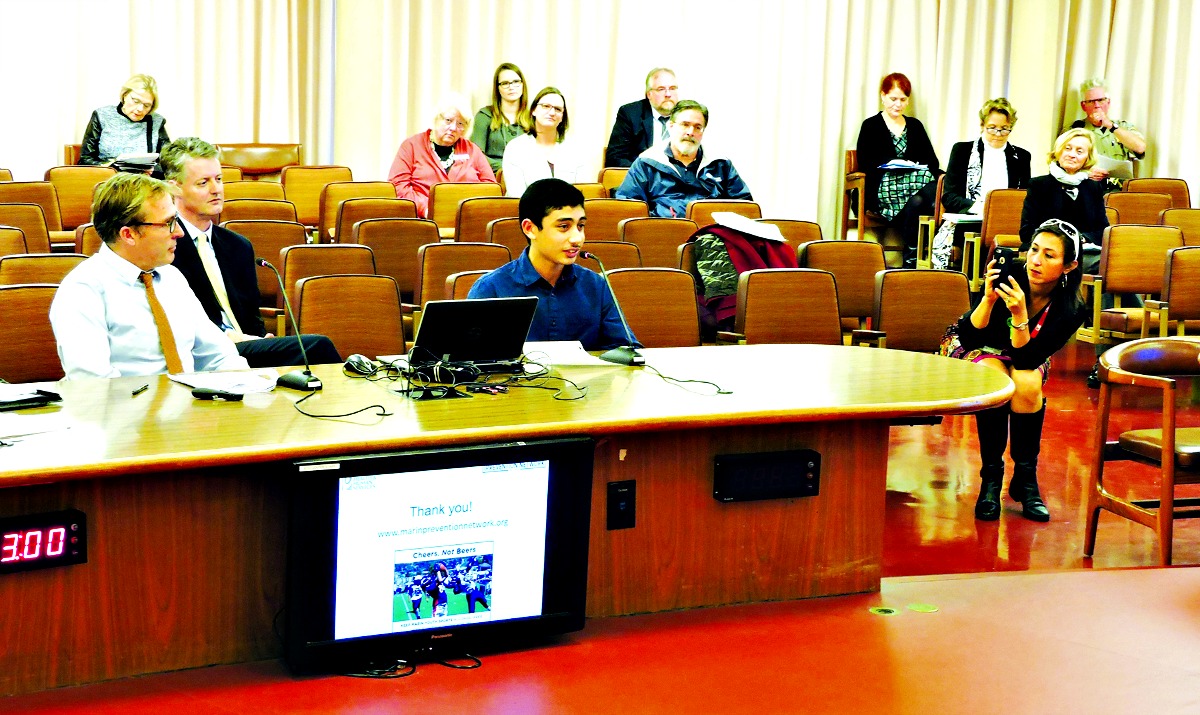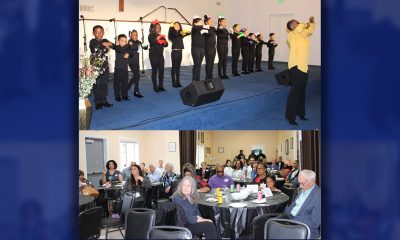Crime
Marin: Health staff urges addition of marijuana to list of prohibited substances

The County of Marin first adopted a social host accountability ordinance in 2006 to help deter underage drinking, and now staff is proposing to add marijuana to the ordinance language plus further measures to reduce drug and alcohol use by minors.
If the ordinance amendment is adopted, party hosts would be liable and subject to fines even if the party location is a bus or limousine. Also, graduation from a restorative justice program would be mandated for all offenders under the age of 21.
The amendment received a first reading before the Marin County Board of Supervisors on June 6, and a merit hearing and subsequent Board vote is scheduled for 10 a.m. June 13.
The social host accountability ordinance holds adults responsible for underage use of alcohol and other controlled substances in their households whether or not the adults are present. The ordinance is designed to confront and mitigate the prevalent problem of underage drinking, drug use and loud or unruly gatherings at private residences or rented facilities.
Supported by more than a dozen local groups, the County strengthened its original social host accountability ordinance in February 2016 by adding controlled substances to the list of prohibitions. It also prohibited loud and unruly parties where controlled substances are served to, possessed by or ingested by people under the age of 21.
Marin has a national reputation as being one of the healthiest counties in the country, but also is known for as having an incredibly high rate of underage drinking and drug use.
“Parents want to know their kids are safe when they’re out with friends,” said Dr. Matt Willis, the County’s Public Health Officer. “Strengthening our social host ordinance sends an important signal that we all share responsibility for the safety of our kids. That’s especially important here in Marin, where our teen substance abuse and DUI rates are high. We’re fortunate our elected leaders and partners in law enforcement are taking a proactive approach to this public health problem.”
Law enforcement officials are allowed to issue citations for civil fines and fees against people responsible for such gatherings. Adults face a civil fine of $750, six hours of observation at a restorative justice hearing, and imposition of all of the costs of law enforcement’s response to the incident, and potential litigation from the families of people injured in the incident. Fines increase with additional violations.
“A restorative justice program helps the underage violator learn from the experience as opposed to their parents simply paying a fine,” Govi said. “I think it’s a good idea that adults are now going to face the required attendance at restorative justice program hearings. That makes this ordinance more effective.”
To date, the Marin County Sheriff’s Office has issued nearly 80 citations for violations in unincorporated Marin since the ordinance was adopted 11 years ago. Violators have paid fines, completed community service hours and participated in alcohol-related education.
Activism
Oakland Post: Week of December 24 – 30, 2025
The printed Weekly Edition of the Oakland Post: Week of – December 24 – 30, 2025

To enlarge your view of this issue, use the slider, magnifying glass icon or full page icon in the lower right corner of the browser window.
Alameda County
Oakland Council Expands Citywide Security Cameras Despite Major Opposition
In a 7-1 vote in favor of the contract, with only District 3 Councilmember Carroll Fife voting no, the Council agreed to maintain its existing network of 291 cameras and add 40 new “pan-tilt-zoom cameras.”

By Post Staff
The Oakland City Council this week approved a $2.25 million contract with Flock Safety for a mass surveillance network of hundreds of security cameras to track vehicles in the city.
In a 7-1 vote in favor of the contract, with only District 3 Councilmember Carroll Fife voting no, the Council agreed to maintain its existing network of 291 cameras and add 40 new “pan-tilt-zoom cameras.”
In recent weeks hundreds of local residents have spoken against the camera system, raising concerns that data will be shared with immigration authorities and other federal agencies at a time when mass surveillance is growing across the country with little regard for individual rights.
The Flock network, supported by the Oakland Police Department, has the backing of residents and councilmembers who see it as an important tool to protect public safety.
“This system makes the Department more efficient as it allows for information related to disruptive/violent criminal activities to be captured … and allows for precise and focused enforcement,” OPD wrote in its proposal to City Council.
According to OPD, police made 232 arrests using data from Flock cameras between July 2024 and November of this year.
Based on the data, police say they recovered 68 guns, and utilizing the countywide system, they have found 1,100 stolen vehicles.
However, Flock’s cameras cast a wide net. The company’s cameras in Oakland last month captured license plate numbers and other information from about 1.4 million vehicles.
Speaking at Tuesday’s Council meeting, Fife was critical of her colleagues for signing a contract with a company that has been in the national spotlight for sharing data with federal agencies.
Flock’s cameras – which are automated license plate readers – have been used in tracking people who have had abortions, monitoring protesters, and aiding in deportation roundups.
“I don’t know how we get up and have several press conferences talking about how we are supportive of a sanctuary city status but then use a vendor that has been shown to have a direct relationship with (the U.S.) Border Control,” she said. “It doesn’t make sense to me.”
Several councilmembers who voted in favor of the contract said they supported the deal as long as some safeguards were written into the Council’s resolution.
“We’re not aiming for perfection,” said District 1 Councilmember Zac Unger. “This is not Orwellian facial recognition technology — that’s prohibited in Oakland. The road forward here is to add as many amendments as we can.”
Amendments passed by the Council prohibit OPD from sharing camera data with any other agencies for the purpose of “criminalizing reproductive or gender affirming healthcare” or for federal immigration enforcement. California state law also prohibits the sharing of license plate reader data with the federal government, and because Oakland’s sanctuary city status, OPD is not allowed to cooperate with immigration authorities.
A former member of Oakland’s Privacy Advisory Commission has sued OPD, alleging that it has violated its own rules around data sharing.
So far, OPD has shared Flock data with 50 other law enforcement agencies.
Activism
Oakland Post: Week of December 17 – 23, 2025
The printed Weekly Edition of the Oakland Post: Week of – December 17 – 23, 2025

To enlarge your view of this issue, use the slider, magnifying glass icon or full page icon in the lower right corner of the browser window.
-

 Alameda County4 weeks ago
Alameda County4 weeks agoSeth Curry Makes Impressive Debut with the Golden State Warriors
-

 Bay Area3 weeks ago
Bay Area3 weeks agoPost Salon to Discuss Proposal to Bring Costco to Oakland Community meeting to be held at City Hall, Thursday, Dec. 18
-

 Activism3 weeks ago
Activism3 weeks agoMayor Lee, City Leaders Announce $334 Million Bond Sale for Affordable Housing, Roads, Park Renovations, Libraries and Senior Centers
-

 Activism3 weeks ago
Activism3 weeks agoOakland Post: Week of December 10 – 16, 2025
-

 Activism3 weeks ago
Activism3 weeks agoOakland School Board Grapples with Potential $100 Million Shortfall Next Year
-

 Arts and Culture3 weeks ago
Arts and Culture3 weeks agoFayeth Gardens Holds 3rd Annual Kwanzaa Celebration at Hayward City Hall on Dec. 28
-

 Activism3 weeks ago
Activism3 weeks ago2025 in Review: Seven Questions for Black Women’s Think Tank Founder Kellie Todd Griffin
-

 Advice3 weeks ago
Advice3 weeks agoCOMMENTARY: If You Don’t Want Your ‘Black Card’ Revoked, Watch What You Bring to Holiday Dinners


























































